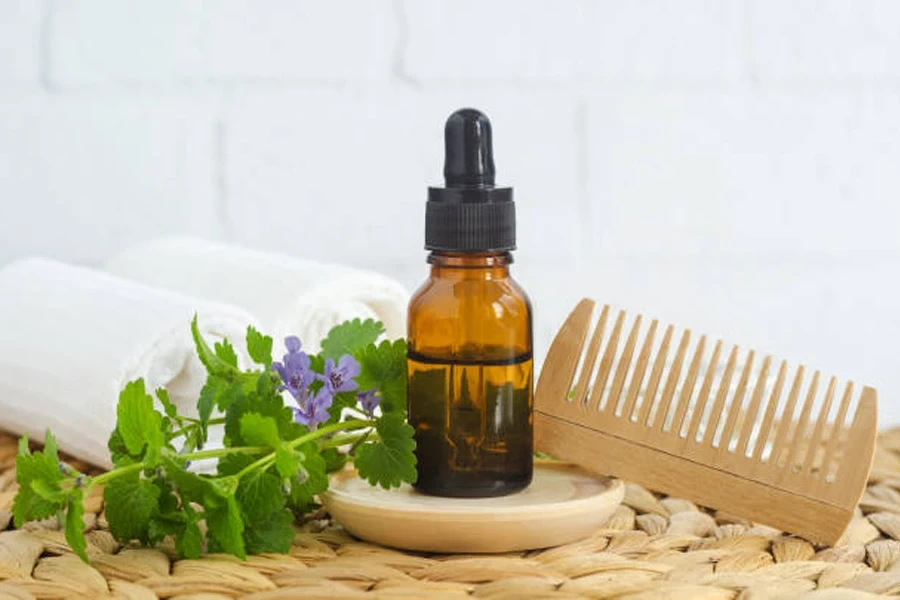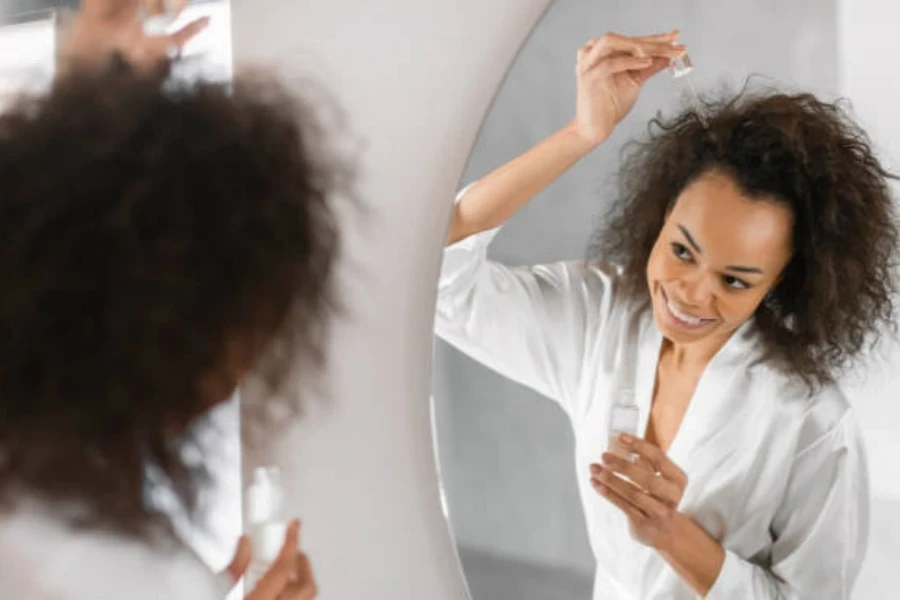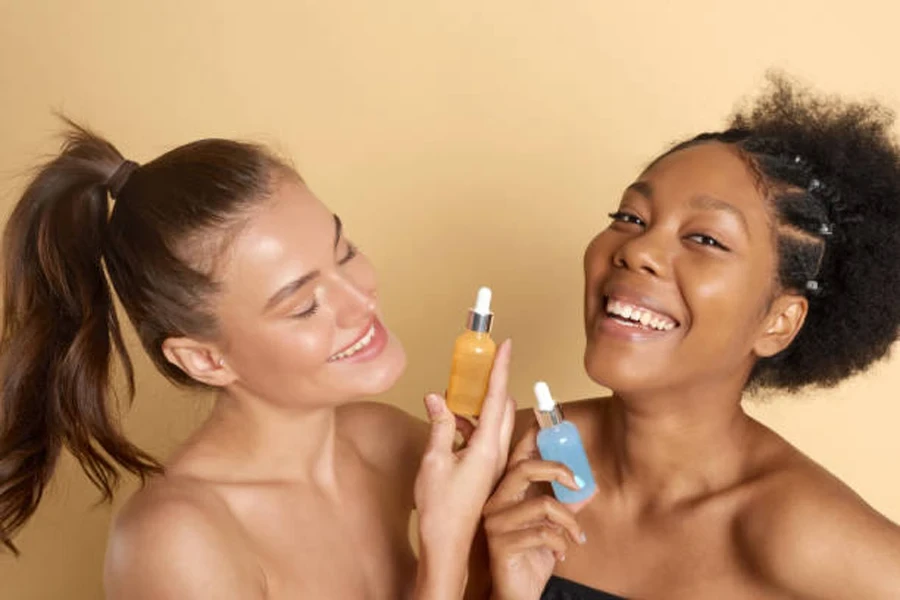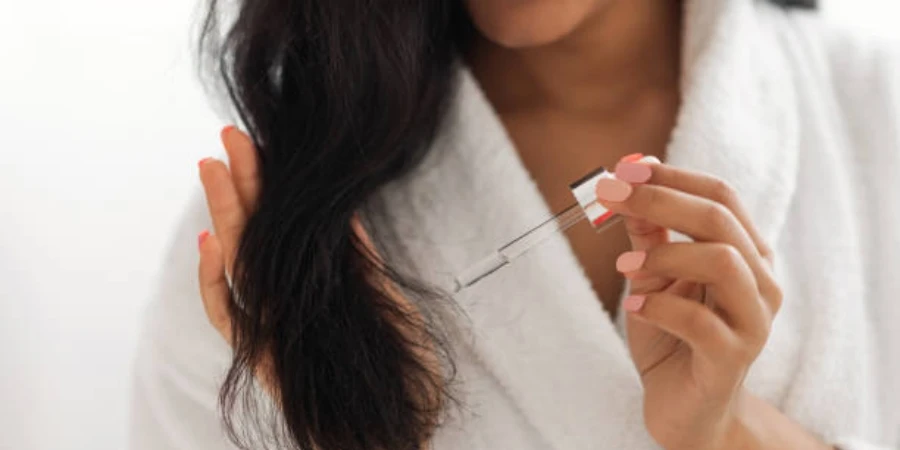Table of Contents
● Introduction
● Understanding the main types of hair serums and their usage
● Market overview of hair serums in 2025
● Key factors to consider when selecting hair serums
● Top hair serum models and their standout features
● Conclusion
Introduction
Hair serums are essential for addressing frizz, adding shine, and protecting hair from damage. In 2025, with innovations in formulations and ingredients, serums will play a crucial role in nourishing and repairing hair, while catering to different types and concerns. Choosing the right serum helps improve hair health, making it a key product in professional hair care routines.
Understanding the main types of hair serums and their usage
Frizz-fighting serums

Frizz-fighting hair serums are designed to smooth hair by addressing the cuticle layer, which, when raised, allows moisture to enter the hair shaft, causing frizz. These serums work by sealing the cuticle, locking out humidity, and making the hair surface smoother and shinier. Formulations often include lightweight oils and silicone-based ingredients to create a protective barrier around each strand.
These products are particularly effective for individuals with wavy, curly, or coarse hair types, which are more prone to frizz in humid or dry conditions. Regular application of frizz-fighting serums can significantly reduce flyaways and help maintain a polished look, even in challenging weather conditions.
Moisturizing serums
Moisturizing serums are formulated to hydrate dry or damaged hair, ensuring that moisture retention is maximized throughout the day. These serums often contain rich oils, such as argan oil, that penetrate the hair shaft to restore hydration, while providing protection from environmental stressors.
This type of serum is ideal for individuals with dry, brittle, or chemically treated hair that needs extra moisture. Regular use of moisturizing serums can help to rebuild and repair hair damaged from heat styling or color treatments, leaving it stronger and more resilient.
Growth-boosting serums
Growth-boosting serums are designed to enhance hair density and regeneration by stimulating the scalp and encouraging stronger hair follicles. These serums often contain active ingredients like peptides and caffeine, which improve scalp circulation and promote healthier hair growth over time.
They are particularly beneficial for individuals experiencing hair thinning or slow growth. By applying the serum directly to the scalp and massaging it in, users can enhance hair follicle health, leading to stronger strands and reduced breakage.
Market overview of hair serums in 2025

Global market size and growth predictions
The hair serum market is currently valued at approximately US$ 2.21 billion and is projected to grow to US$ 3.47 billion by 2029. This growth represents a compound annual growth rate (CAGR) of 7.10% from 2024 to 2029. The increase in demand is driven by rising concerns about hair health, a preference for organic products, and a growing awareness of advanced hair care solutions.
North America holds the largest market share, while the Asia-Pacific region is identified as the fastest-growing market. Hair serums have become vital for maintaining hair health, especially with the rise of heat styling tools and chemical treatments. As consumers increasingly prioritize nourishment and protection, the market for advanced, multi-functional serums is set to grow significantly.
Consumer preferences and shifts
Consumer preferences are increasingly shifting towards hair serums that offer protection from environmental factors like pollution and UV exposure. As awareness of these pollutants’ damaging effects grows, demand for protective serums is on the rise. Many formulations now include antioxidants and protective polymers for comprehensive defense.
There’s also a significant move towards cruelty-free, vegan, and natural ingredient serums, reflecting a broader trend in eco-conscious beauty. Consumers prefer plant-based oils such as argan and jojoba for their nourishing properties, viewing them as ethical alternatives to synthetic options. This demand for natural and organic hair care is prompting brands to prioritize transparency and clean beauty, with consumers seeking products that deliver effective results while adhering to high ethical standards in sourcing and production.
Key factors to consider when selecting hair serums
Hair type compatibility
Choosing the right hair serum is essential and largely depends on hair type. These products are not one-size-fits-all; using the wrong type can lead to unsatisfactory results. Fine or thin hair benefits from lightweight formulas that avoid a greasy look, while thicker hair types, such as coarse or curly hair, require richer serums for deep hydration and frizz control.
Curly hair needs products that penetrate and lock in moisture, often featuring humectants and oils to enhance curl definition while reducing frizz. In contrast, fine hair is better suited to lightweight serums that manage frizz without weighing it down. Understanding these distinctions is crucial for selecting the most effective serums for specific hair textures.
Core ingredients and their benefits

The composition of a hair serum is vital for its effectiveness, making it essential to understand key ingredients for informed choices. Serums enriched with natural oils, such as argan oil, provide hydration and nourishment, delivering moisture and nutrients that repair damage and maintain softness. Additionally, peptides and antioxidants support scalp health and stimulate hair growth.
When selecting a serum, avoiding harmful ingredients is crucial. Alcohol-based serums can dry out hair, stripping it of moisture and causing long-term damage. By prioritizing high-quality ingredients like jojoba oil, peptides, and vitamins, hair can be better protected from environmental damage while staying healthy and resilient.
Longevity and effects on styling
A serum’s ability to maintain style and protect hair between washes is crucial. Long-lasting serums keep hair smooth and reduce the need for frequent reapplication, making them convenient for daily use. They are especially beneficial for those who use heat styling tools, as they protect hair from high temperatures while locking in moisture.
Products that offer longevity significantly enhance the styling process by maintaining hair shape and smoothness. This is vital for individuals who frequently style their hair or are exposed to fluctuating humidity levels. Serums that provide these long-lasting benefits improve both the health and appearance of the hair.
Sustainability and packaging
As environmental awareness rises, consumers are increasingly favoring hair serums with sustainable packaging and eco-friendly ingredients. Many brands are responding by offering effective products aligned with eco-conscious values, including cruelty-free and vegan options that avoid animal testing and synthetic chemicals.
Sustainable packaging is also becoming essential, with more brands adopting recyclable or biodegradable materials. This approach not only reduces waste but also appeals to environmentally conscious consumers. The focus on sustainability in both ingredients and packaging is helping brands meet the growing demand for greener hair care solutions.
Top hair serum types and their standout features

Bond-repair serums
Bond-repair serums are designed to restore the internal structure of damaged hair, strengthening weakened strands and reducing split ends. These serums work by targeting the bonds within the hair, which are often broken due to heat styling, chemical treatments, or environmental exposure. By fortifying these bonds, the hair becomes more resilient, smoother, and less prone to breakage. Bond-repair serums are suitable for all hair types but are particularly beneficial for chemically treated or damaged hair, helping to improve both strength and elasticity over time.
Hydrating and nourishing serums
Hydrating serums are formulated to deeply moisturize the hair, making them ideal for managing dry, frizzy, or coarse hair. These serums often contain natural oils and nourishing ingredients that penetrate the hair shaft, restoring moisture and leaving the hair soft and manageable. Hydrating serums can be applied to both damp and dry hair, making them versatile for different styling needs. Their lightweight nature ensures that they hydrate without weighing down the hair, improving texture, shine, and smoothness.
Hair growth and thickening serums
Hair growth and thickening serums are designed to promote scalp health and stimulate hair follicles, encouraging stronger, thicker hair growth. These serums typically contain a blend of peptides, plant-based extracts, and other active ingredients that target thinning areas and help improve overall hair density. With regular use, these serums can reduce hair shedding and promote the appearance of fuller, healthier hair. They are particularly effective for individuals experiencing hair thinning or loss, as they strengthen the scalp and enhance hair growth over time.

Conclusion
In 2025, selecting the right hair serum involves understanding specific needs like hair type, damage, and styling habits. With cutting-edge formulations designed to address issues from frizz control to scalp health, today’s serums offer tailored solutions for every concern. Whether focused on repair, protection, or nourishment, choosing the best product can significantly improve hair strength and appearance. As the market continues to evolve, investing in the right serums will ensure hair care routines stay effective and aligned with the latest innovations.




